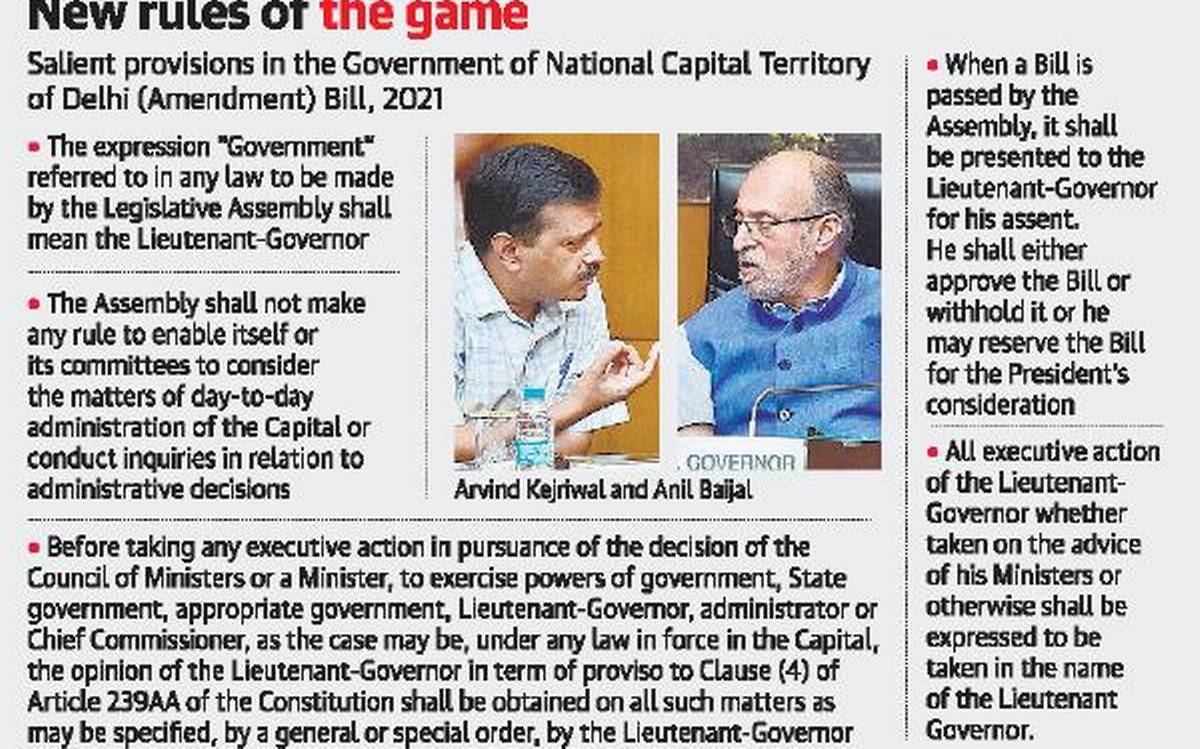Three decades after it was enacted, significant amendments have been proposed to the Government of National Capital Territory of Delhi Act, 1991, bringing contradictions between the Central and Delhi governments to the fore once again.
Contrary to the spirit of the constitution:
- Some experts were of the opinion that the new Bill will seek to render the office of the Chief Minister a vestigial organ in the name of simplifying administration.
- Others argued that the amendments will iron out “needless” issues arising out of politics in a city where the Lieutenant-Governor had “always been the government”.
- Senior advocate at the Supreme Court Rebecca John said the Bill would snatch away from the residents of Delhi the accountability and answerability they sought from the elected representatives and hand them to a nominated official.
- It would be a tragedy since Delhi has long sought statehood; that the longstanding wish of the city’s residents should fructify in this way is contrary to the spirit of the Constitution. The will of the people cannot be thwarted in this way.
Against federal principles:
- Professor Pradip Kumar Datta, an independent academic formerly associated with JNU, said the Bill seemed to go against the federal principles and was a setback for popular representation.
- Centralisation has been increasing in both formal and informal ways after this government came to power at the Centre. This [Bill] will seemingly just speed up the pace of centralisation of power.
- Senior advocate at the Supreme Court Sanjay Hegde said the Bill would set in motion a reversal of the clock on statehood for Delhi, which was the BJP’s own demand in the past.
- The Bill seems to negate whatever small gains had accrued to the Delhi government after its tussle with the Centre reached the judiciary.
- Manisha Priyam, political analyst and researcher, said the Bill may seek to clarify who or what the term “government” meant in the city, but residents may not take kindly to the exercise.
Taste of democracy:
- Governance in a city like Delhi presents many challenges which could be confronted better through synchronised efforts at helping those among its lowest strata
- Over the last several decades, this city has tasted democracy and witnessed a robust democratic process.
- People may not take very kindly to losing such significant aspects of living in Delhi.
- A majority of residents have tenuous lifestyles and administration here would be better handled with the deepening of democracy, not by weakening it.
- S. Mehra, a former bureaucrat who led the unified Municipal Corporations of Delhi as Commissioner, saw the step as one in the right direction.
- In the Government of National Capital Territory of Delhi] Act, 1991, it is already clear that the Lieutenant-Governor is the government. This [amendments] seems to be a positive step for the welfare of the people of Delhi

- K. Sharma, a constitutional expert said the two governments — the Centre and the Delhi government — were not concurrent. The first one is the actual government while the other falls under the definition of what B.R. Ambedkar called local administration.
- The Delhi Assembly, as far as the larger constitutional picture is concerned, is not comparable to other legislatures because Delhi is not a State.
- It [the Assembly] is just a small set-up of elected representatives whom the L-G can consult from time to time.
SOURCE: THE HINDU,THE ECONOMIC TIMES
 Chinmaya IAS Academy – Current Affairs Chinmaya IAS Academy – Current Affairs
Chinmaya IAS Academy – Current Affairs Chinmaya IAS Academy – Current Affairs



